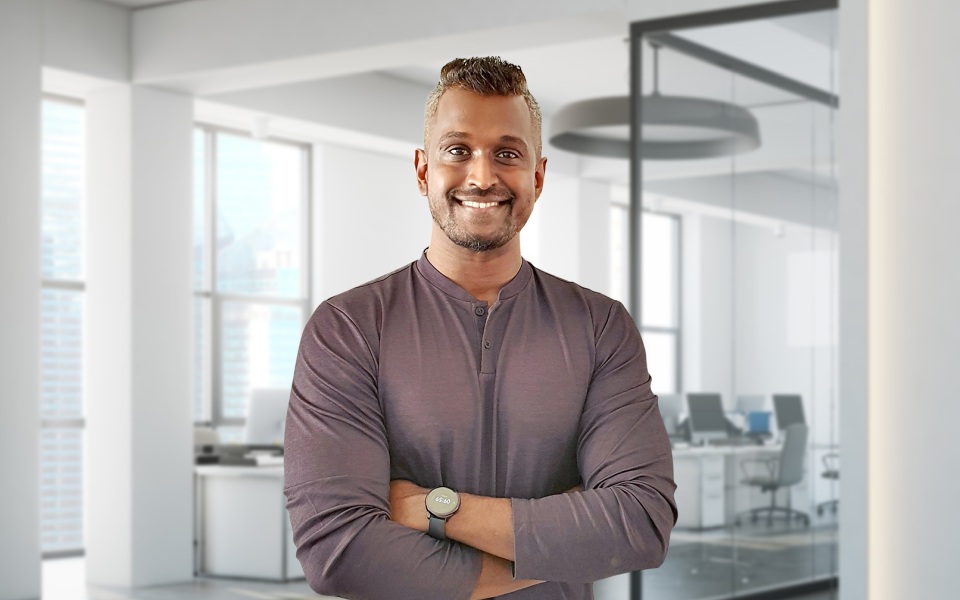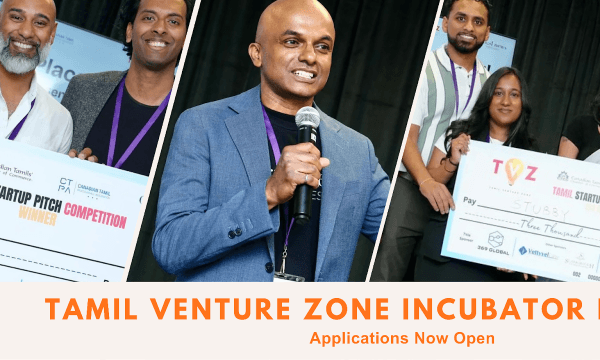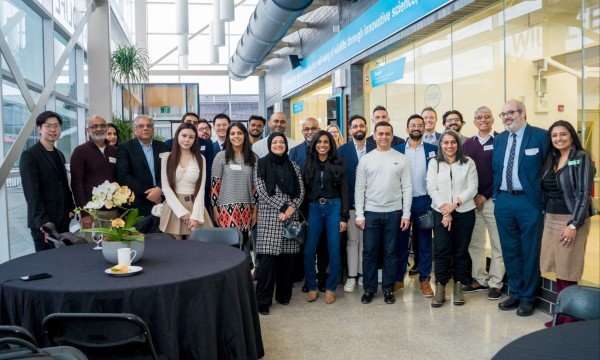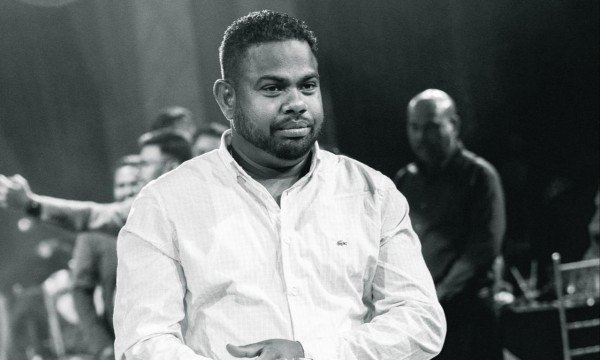
___
***Are you or someone you know in the global Tamil community doing great things? We'd love to feature them: FILL OUT THIS FORM ***
Network & collaborate with Tamil Changemakers from around the world. Request to join our private LinkedIn community here.
___
Tell us a bit about your upbringing and how that potentially played a part in you becoming a serial entrepreneur.
I was born and raised in Jaffna, and between the ages of 8 and 13, I’d moved something like 13 times in those 5 years. All of these moves were prompted by the war. And each one meant that we were having to quickly adapt to spaces that came with less than we’d had before. This forced my family to be really resourceful and to try to make the best of each situation.
Back then I can’t say that I minded all of the disruptions. As a kid it seemed fun to have long breaks from school. But over time there was definitely a feeling that built up in me that I wanted to be in control of my future and to create opportunities for myself and others. I think that’s at the heart of how and why I became a serial entrepreneur. I’m always looking for ways to create, adapt and grow because I don’t want to be limited by someone else’s vision of what I can or cannot do. And I love being able to create opportunities for others to push the boundaries of what’s possible for them as well.
What was the inspiration behind Kimp?
There were a few sources of inspiration for launching Kimp as a subscription based design service. One was definitely our incredible team. At the point at which we realized our previous business model just wasn’t working anymore, we’d built a great team that had gone through a lot together. We couldn’t imagine calling it quits. So we threw everything we had into trying to find a new business model that would work for us.
The inspiration for our business model came from Design Pickle. It’s a subscription based design service launched by innovative serial entrepreneur Russ Perry who’d previously run a design agency. He’d figured out a way to turn a service-based business into a productized service, and that gave us a blueprint that we could adapt and build on.
Outside of the realm of design I’d say there are a couple other sources of inspiration that kept me going before and after we launched. One would be the entrepreneurial spirit in India. I first went there back in 2009 to set up a creative team for Doto, the design agency I was focusing on building at the time. Being in India on and off from then on was a steady source of motivation. It felt like everywhere I looked, I’d see entrepreneurs working on businesses of all sizes, with a level of commitment and determination I hadn’t seen before. It didn’t matter whether they had a lot or a little when it came to resources, there was, and still is, an enduring and innovative spirit of facing and overcoming any kind of challenge.
What is Kimp’s revenue model and how was this decision made internally?
We have a subscription revenue model for our productized service. We chose to go the subscription route because it offers a lot of predictability, which frees us up to focus on optimizing operations and activities that help us scale.
Productized services, for anyone who might not be familiar with the term, are services that are standardized and then sold for fixed prices, just like products are. You know what you’re paying for, and exactly what you’ll be paying.
On the business’ end, it’s great for planning. And it also works really well for clients who can pay a flat monthly fee for the services they receive.
What was the impact of the COVID pandemic on your business?
It’s forced us to expand at a rate that we couldn’t have anticipated. In early 2020, we were mapping out plans to grow our team and establish physical hubs in a few different countries. We even managed a trip to Sri Lanka to do some hiring and scope out some spaces.
And then came the lockdowns. As soon as we caught wind of the impact COVID was having in March 2020, we started preparing to get everyone set up to work remotely. And in doing this we realized that we didn’t need to set up physical office spaces in order to get our teams up and running in new cities/countries. The pandemic had forced us to create remote processes and given us the proof of concept that we could use them to not only keep our existing workflows going but to scale as well.
We went from a team of 60 in early 2020 to over 250 to date, and expanding from just offering graphic design to video design (e.g. editing, animation, etc.) as well. And then trying to quickly develop all of the tools and processes we needed to keep a team of this size going.
In the midst of all this, we were all dealing with COVID - either getting sick, or supporting loved ones - and on pins and needles about whether our clients would be ok or need to scale back.
We’ve seen some clients unfortunately going through tough times and having to scale back or pause subscriptions due to the impacts of the pandemic. And we’ve also seen clients from new industries and niches looking for remote services signing up as well.
It’s been a really mixed bag of emotions and experiences over the past 2 years and I’m grateful we’re still able to keep going and growing.
How did the founding group come together?
Since Kimp came about through a pivot, a lot of our core team members were already working together as part of Doto, our previous business. This includes my Co-Founder, Venhad. And a few key hires we’d made in the final year before our pivot. Funny enough, we made those hires thinking they would be helping launch and/or expand services that were a part of Doto. now they have become integral parts of a pivot, and the launching and scaling of Kimp.
Can you tell us about a failure you’ve experienced along your entrepreneurial journey and what you learned from it?
One of the greatest successes I’d experienced in my entrepreneurial journey ultimately taught me the most when it became one of the failures I’ve experienced as well. And that was the design agency I launched back in 2010 (Doto). Things started off really well, in terms of being able to acquire great clients, work on exciting projects, and create job opportunities for talented designers.
But fast forward to 2018 and we’d run into the same challenge that many other design agencies do. When you operate as an agency your strength, and a potentially fatal flaw, can be that you specialize in design for a particular niche or industry. And if that niche or industry experiences a downturn your bottom line can go with it. That was the case for us. We were very dependent on a few clients with big accounts, and then they started reducing their spend on marketing and design.
We were bleeding money trying to keep things afloat and figure out whether there were other niches that we would be a good fit for.
An added problem was that we had grown the business based on the needs of the particular industry we came to specialize in. So our services, and structure, weren’t a clear fit for others. However, we knew we had a very talented team and that graphic design was something businesses across the board needed on an ongoing basis. They just didn’t need them in the particular model we were offering them.
So we went back to the drawing board considering how, and whether, to pivot. And came up with a couple of business ideas to try. And then for a few months we were launching everything on all cylinders, hoping something would stick. A few of us were trying to land new clients for Doto. And others were focused on trying to establish proof of concept and traction for some of the ideas we were exploring.
Ultimately it was subscription based design that stuck. But landing on the right model to pivot into was just the start.
It was a wild time to put it mildly. We were working around the clock trying to make sure the existing clients of Doto were still happy, and trying to build and launch something new. And the former was funding the latter so there was no option to hit the brakes on one thing and throw all our resources behind the other. The biggest lesson at the point was just how important it is to surround yourself with the right people and team.
_____________________________
Related Articles:
- "The Tamil Creator Podcast (Ep.40): Roy Ratnavel - From Mail Clerk To Executive Vice-President at CI Financial"
- "The Tamil Creator Podcast (Ep.39): Luxy Thuraisingam - Storyteller & Leader, Head of Global Partner Marketing At Cisco"
- "The Tamil Creator Podcast (Ep.38): Sathish Bala - CEO of EdTech Startup Schoolio + Founder of desiFEST (largest South Asian Music Festival in North America)"
- "The Tamil Creator Podcast (Ep.37): Krish O'Mara Vignarajah - Former Policy Director To Michelle Obama + President/CEO Of LIRS"
- "The Tamil Creator Podcast (Ep.36): Stefan Thurairatnam - Luxury Brand Influencer Travelling The World After Quitting 9-5 Corporate Finance Job"
- "The Tamil Creator Podcast (Ep.35): Sumi Shan - Former Politico & Co-Founder of Agritech Startup (Dunya Habitats)"
- "The Tamil Creator Podcast (Ep.34): Robert Rajeswaran – Singapore-Based Serial Entrepreneur (Born in Sri Lanka & Raised in London) & Co-Founder of Boxaroo"
- "The Tamil Creator Podcast (Ep.33): Ashanti Omkar - UK-Based BBC Broadcaster & Music/TV/Film Critic"
- "The Tamil Creator Podcast (Ep.32): Amarnath Amarasingam - Hip Hop Aficionado, Assistant Professor, Researcher & Author"
- "These Tamil Entrepreneurs Share How They Grew Their Side Hustles"
_____________________________
What would be a business you would be working on starting today and spend the next 5 years on - if you didn’t have Kimp on the table?
If Kimp wasn’t on the table, I’d be working on building out a SAAS app that manages remote teams. I’ve always loved tools that increase productivity and efficiency, and a well-designed UI. And we’ve actually built out a few tools to manage our team over the past year - it would be really interesting to roll that out to others, explore different use cases and continue to build on that.
Where do you see yourself in 5 years?
There are a few things that I can say with confidence - I’ll still be traveling and trying new experiences. I’ll still be on my entrepreneurial journey. But beyond that, I’m definitely still learning and working on building new opportunities as I go. So I’m staying open to whatever I can create, or may come my way.
What do you do outside of work for fun?
I love being active and working out, reading books on entrepreneurship or historical events, watching documentaries, and spending time with friends and family.
What is an insecurity you have?
Public speaking is still something I’m chipping away at. The insecurity creeps up especially if I don’t have as much experience or exposure to a particular topic or realm. Or if I’m addressing a larger group.
In terms of your personal legacy, in a few sentences, describe how you want to be remembered by your family and friends?
I want to be remembered by my friends and family as someone who created opportunities for others and empowered people. No matter what I do, that’s always my biggest motivation.
What do you think you would tell 16-year Senthu looking back?
Looking back, I would tell 16-year old Senthu to take more risks and to pay less attention to what others think - to just go after things if I believe in them. That’s reason enough.
What book have you read or podcast have you listened to recently that’s impacted your life in a positive way?
"Atomic Habits" by James Clear. It’s a fantastic read on forming habits for success. The author does such a great job of breaking down the process, and explaining different aspects of it. I think anyone, at any stage of their lives, can really benefit from it.
What is a new belief, behaviour or habit that has most improved your life?
Working out every morning. Nothing beats it for me as a source of clarity and energy throughout my day.
If you were given $1 billion, how would you allocate the money to change the world?
I’d want to use that money to set up seed funding for entrepreneurs and to create programs that would encourage, and create capacity in people, to become entrepreneurs. There are brilliant entrepreneurial minds all over the world that are struggling with a lack of access to training, the right networks and opportunities. And when you empower an entrepreneur, you can really empower all of the communities they will impact.
How would you describe the impact that the Toronto Tamil community has had on you personally and professionally?
I think the community has achieved a lot, in many different realms. And to have done that in spite of experiencing so many challenging circumstances has been really encouraging to see. Especially as people break new ground and make an impact locally within their communities, nationally, or even internationally.
At the same time, I can see a lot of potential and room for growth, and that’s inspired some of my own. For example, some of my first design clients were in the Toronto Tamil community, at a time when design and marketing weren’t really high priorities for many businesses. But I reached out to them and they took a chance on me, allowing me to gain experience, and contribute towards their growth in those areas.
What is your favourite Tamil food (meal or dessert)?
Mutton curry.
What is your favourite Tamil movie?
Jai Bhim.
What does Tamil culture mean to you?
It’s a source of strength.
**Looking to create your love story? Join the other couples who have dated and got married through myTamilDate.com!***
"myTamilDate Love Story: Jenani & Nav Found Each Other At The Right Time And Right Place In Life"
"myTamilDate.com Love Story: Tharshi & Ravi Found Love During Lockdown"
"How France Met Canada: A MyTamilDate.com Love Story"
***CLICK HERE to listen to us on Spotify!***
Related Articles:
- "Award-Winning Tamil-American Author And Educator SJ Sindu, Releases Second Novel Called "Blue-Skinned Gods" That Explores Identity, Faith, Family & Sexuality"
- "Serial Entrepreneur Vinoth Kumar Created Singapore-Based App ABL-ify To Remove Stigmas Around Autism In Asian Communities"
- "Boston-Based Suba Suntharalingam Overcomes Challenges As An Immigrant To Start Non-Profit Providing Opportunities For The Wounded, Widows and Orphans of War In Sri Lanka"
- "Elite Athlete, Coach, Future Chiropractor & Entrepreneur Abirami Shanmugaratnam Is Making Waves In The Athletic Performance Industry"
- "Toronto's OG Food Writer Suresh Doss Is Using His Reach And Voice To Help Engineer A Comeback For Beleaguered Restaurant Industry"
- "Ballet And Kung Fu Trained Australian Actress & Writer Rubi Balasingam Is Promoting Tamil Voices In Aussie TV And Film"
- "Yathusha Kulenthiran's Marketplace For Environmentally Sustainable Palmyra Products Empowers Female Artisans In Sri Lanka"
- "Australian-Tamil Entrepreneur Sujan Selven Is Creating Economic Opportunities For Remote Villages In Northeast Sri Lanka Using Upcycled Devices & Improved Connectivity"
- "Crypto Tinhorn & Former Journalist Anand Venkateswaran Talks About Buying A $69M Digital Art Piece, Collecting Stories & Catalyzing Change"
- "Tamil Innovators Spotlight: Abarna Raj, CEO of Australian Social Startup Palmera, Is Tackling World Poverty"
- "Tamil Innovators Spotlight: Tea Drops CEO & Founder, Sashee Chandran"
- "Tamil Innovators Spotlight: Knowledgehook's CEO, Travis Ratnam"
- "Tamil Innovators Spotlight: Kabo CEO & Founder, Vino Jeyapalan"
- "Danny Sriskandarajah's Journey From Rural Sri Lanka to CEO of Oxfam Great Britain"
- "The NBA Bubble: Dr. Priya Sampathkumar Helped Make It Happen"
- "These Tamil Founders Behind Agritech Startup Dunya Habitats Want To Alleviate Food Security Globally"
- "Marketing Maven Jackson Jeyanayagam Shares Insights From His Illustrious 20-Year Career"
- "Angel Investor Jay Vasantharajah On Building His Portfolio One Day At A Time"
- "Breaking Into Hollywood: Meet Tamil-Canadian Actor Vas Saranga"
- "Meet Rebecca Dharmapalan - Filmmaker, Legal Scholar, And Activist"


























